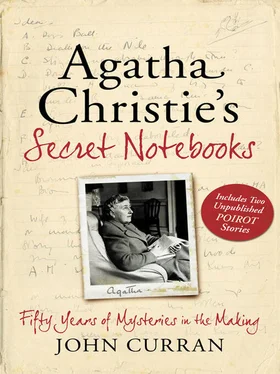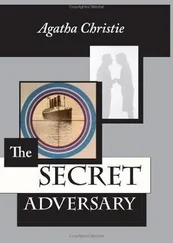‘Bank holiday was the 10th of August,’ [16] This should read ‘April’.
said Poirot. He looked at me meaningfully. ‘Friday would be the 14th. And what next? Did Miss Wheeler get up again?’
‘Oh! yes, sir. She got up on the Saturday, and Miss Mollie and Mr James they came down again, being anxious about her, you see. Mr James he even came down the weekend after that.’
‘The weekend of the 22nd?’
‘Yes, sir.’
‘And when was Miss Wheeler finally taken ill?’
‘It was the 25th, sir. Mr James had left the day before. And Miss Wheeler seemed as well as she’d ever been—bar her indigestion, of course, but that was chronic. Taken sudden after the sayance, she was. They had a sayance after dinner, you know, so the Miss Pyms went home and Miss Lawson and I got her to bed and sent for Dr Lawrence.’
Poirot sat frowning for a moment or two, then he asked Ellen for the address of Miss Davidson and Mr Graham and also for that of Miss Lawson.
All three proved to be in London. James Graham was junior partner in some chemical dye works, [17] Oddly, this very specific occupation, suspicious in the context of a poisoning mystery, is never mentioned again.
Miss Davidson worked in a beauty parlour in Dover Street. Miss Lawson had taken a flat near High Street, Kensington.
As we left, Bob, the dog, rushed up to the top of the staircase, lay down and carefully nosed his ball over the edge so that it bumped down the stairs. He remained, wagging his tail, until it was thrown up to him again.
‘The incident of the dog’s ball,’ murmured Poirot under his breath.
v
A minute or two later we were out in the sunshine again.
‘Well,’ I said with a laugh. ‘The dog’s ball incident did not amount to much after all. We now know exactly what it was. The dog left his ball at the top of the stairs and the old lady tripped over it and fell. So much for that!’
‘Yes, Hastings, as you say—the incident is simple enough. What we do not know—and what I should like to know—and what I mean to know—is why the old lady was so perturbed by it?’
‘Do you think there is anything in that?’
‘Consider the dates, Hastings. On Monday night, the fall. On Wednesday the letter written to me. On Friday the altered will. There is something curious there. Something that I should like to know. And ten days afterwards Miss Wheeler dies. If it had been a sudden death, one of these mysterious deaths due to “heart failure”—I confess I should have been suspicious. But her death appears to have been perfectly natural and due to disease of long standing. Tout de même —’
He went off into a brown study. Finally he said unexpectedly:
‘If you really wished to kill someone, Hastings, how would you set about it?’
‘Well—I don’t know. I can’t imagine myself—’
‘One can always imagine. Think, for instance, of a particularly repellent money-lender, of an innocent girl in his clutches.’
‘Yes,’ I said slowly. ‘I suppose one might always see red and knock a fellow out.’
Poirot sighed.
‘Mais oui, it would be that way with you! But I seek to imagine the mind of someone very different. A cold-blooded but cautious murderer, reasonably intelligent. What would he try first? Well, there is accident. A well staged accident— that is very difficult for the police to bring home to the perpetrator. But it has its disadvantages—it may disable but not kill. And then, possibly, the victim might be suspicious. Accident cannot be tried again. Suicide? Unless a convenient piece of writing with an ambiguous meaning can be obtained from the victim, suicide would be very uncertain. Then murder—recognised as such. For that you want a scapegoat or an alibi.’
‘But Miss Wheeler wasn’t murdered. Really, Poirot—’
‘I know. I know. But she died, Hastings. Do not forget— she died. She makes a will—and ten days later she dies. And the only two people in the house with her (for I except the cook) both benefit by her death.’
‘I think,’ I said, ‘that you have a bee in your bonnet.’
‘Very possibly. Coincidences do happen. But she wrote to me, mon ami, she wrote to me, and until I know what made her write I cannot rest in peace.’
vi
It was about a week later that we had three interviews.
Exactly what Poirot wrote to them I do not know, but Mollie Davidson and James Graham came together by appointment, and certainly displayed no resentment. The letter from Miss Wheeler lay on the table in a conspicuous position. From the conversation that followed, I gathered that Poirot had taken considerable liberties in his account of the subject matter.
‘We have come here in answer to your request, but I am sorry to say that I do not understand in the least what you are driving at, M. Poirot,’ said Graham with some irritation as he laid down his hat and stick.
He was a tall thin man, looking older than his years, with pinched lips and deep-set grey eyes. Miss Davidson was a handsome fair-haired girl of twenty-nine or so. She seemed puzzled, but unresentful.
‘It is that I seek to aid you,’ said Poirot. ‘Your inheritance it has been wrested from you! It has gone to a stranger!’
‘Well, that’s over and done with,’ said Graham. ‘I’ve taken legal advice and it seems there’s nothing to be done. And I really cannot see where it concerns you, M. Poirot.’
‘I think James, that that is not very fair to M. Poirot,’ said Mollie Davidson. ‘He is a busy man, but he is going out of his way to help us. I wish he could. All the same, I’m afraid nothing can be done. We simply can’t afford to go to law.’
‘Can’t afford. Can’t afford. We haven’t got a leg to stand upon,’ said her cousin irritably.
‘That is where I come in,’ said Poirot. ‘This letter’—he tapped it with a finger-nail—has suggested a possible idea to me. Your aunt, I understand, had originally made a will leaving her property to be divided between you. Suddenly, on the 14th April she makes another will. Did you know of that will, by the way?’
It was to Graham he put the question.
Graham flushed and hesitated a moment.
‘Yes,’ he said. ‘I knew of it. My aunt told me of it.’
‘What?’ A cry of astonishment came from the girl.
Poirot wheeled round upon her.
‘You did not know of it, Mademoiselle?’
‘No, it came as a great shock to me. I thought it did to my cousin also. When did Auntie tell you, James?’
‘That next weekend—the one after Easter.’
‘And I was there and you never told me?’
‘No—I—well, I thought it better to keep it to myself.’
‘How extraordinary of you!’
‘What exactly did your aunt say to you, Mr Graham?’ asked Poirot in his most silky tone.
Graham clearly disliked answering the question. He spoke stiffly.
‘She said that she thought it only fair to let me know that she had made a new will leaving everything to Miss Lawson.’
‘Did she give any reason?’
‘None whatever.’
‘I think you ought to have told me,’ said Miss Davidson.
‘I thought better not,’ said her cousin stiffly.
‘Eh bien,’ said Poirot. ‘It is all very curious. I am not at liberty to tell you what was written to me in this letter, but I will give you some advice. I would apply, if I were you, for an order of exhumation.’
They both stared at him without speaking for a minute or two.
‘Oh! no,’ cried Mollie Davidson.
‘This is outrageous,’ cried Graham. ‘I shall certainly not do anything of the sort. The suggestion is preposterous.’
Читать дальше
Конец ознакомительного отрывка
Купить книгу












